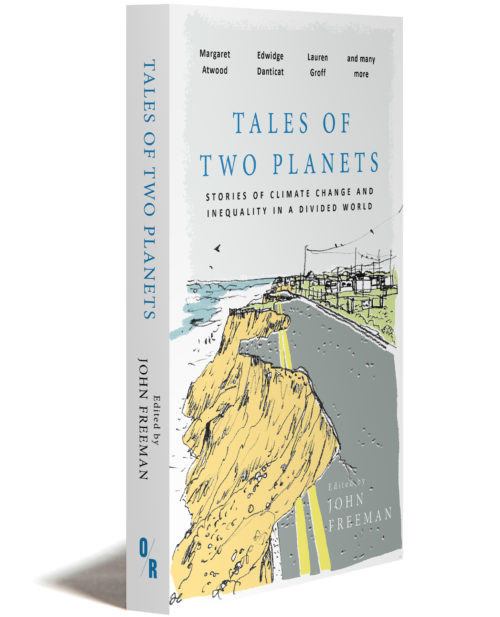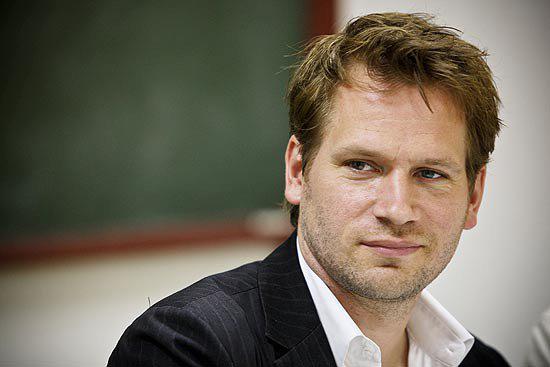Tales of Two Planets
"[E]nvironmental and humanitarian crises in Egypt, Mexico, Hawaii, New Zealand, Bangladesh, Nigeria, and beyond are brought forward in masterful works elegiac, angry, and ironic in Freeman's clarion global chorus."
- Booklistabout the bookabout
Building from his acclaimed anthology Tales of Two Americas, beloved writer and editor John Freeman draws together a group of our greatest writers from around the world to help us see how the environmental crisis is hitting some of the most vulnerable communities where they live.
In the past five years, John Freeman, previously editor of Granta, has launched a celebrated international literary magazine, Freeman's, and compiled two acclaimed anthologies that deal with income inequality as it is experienced. In the course of this work, one major theme came up repeatedly: Climate change is making already dire inequalities much worse, devastating further the already devastated. But the problems of climate change are not restricted to those from the less developed world.
Galvanized by his conversations with writers and activists around the world, Freeman engaged with some of today's most eloquent storytellers, many of whom hail from the places under the most acute stress–from the capital of Burundi to Bangkok, Thailand. The response has been extraordinary. Margaret Atwood conjures up a dystopian future in a remarkable poem. Lauren Groff whisks us to Florida; Edwidge Danticat to Haiti; Tahmima Anam to Bangladesh; Yasmine El Rashidi to Egypt, while Eka Kurniawan brings us to Indonesia, Chinelo Okparanta to Nigeria, and Anuradha Roy to the Himalayas in the wake of floods, dam building, and drought. This is a literary all-points bulletin of fiction, essays, poems, and reportage about the most important crisis of our times.
With contributions by: Sulaiman Addonia, Juan Miguel Álvarez, Tahmima Anam, Margaret Atwood, Edwidge Danticat, Tishani Doshi, Yasmine El Rashidi, Mariana Enriquez, Gaël Faye, Aminatta Forna, Lauren Groff, Eduardo Halfon, Mohammed Hanif, Ishion Hutchinson, Daisy Johnson, Lawrence Joseph, Billy Kahora, Eka Kurniawan, Krys Lee, Andri Snær Magnason, Khaled Mattawa, Ligaya Mishan, Lina Mounzer, Sayaka Murata, Chinelo Okparanta, Diego Enrique Osorno, Anuradha Roy, Raja Shehadeh & Penny Johnson, Sjón, Lars Skinnebach, Burhan Sönmez, Pitchaya Sudbanthad, Ian Teh, Tayi Tibble, and Joy Williams
About The Author / Editor
Preview
The Astronomical Cost of Clean Air in Bangkok
Pitchaya Sudbanthad
The condo salespeople like to point out that the higher you live, the whiter your lungs. They'll tell you that less tainted air here sweeps freely above the smog that keeps Bangkok in a perpetual haze. Up this high, you can look forward to breathtaking views of color-saturated sunsets. The way the sunsets are described makes you think of ones seen after terrific volcanic eruptions. That view. Not every hundred years. Not even every decade. Champagne-worthy sunsets are yours every evening.
These are spectacular times for those who value great heights; you've looked it up. In the mid-1980s, the tallest building in Bangkok reached 33 floors; the tallest one now-just over thirty years later—has 70, with a 125-floor tower slated for completion by 2025.
The urge to build higher never abates, because the worshipful pray skyward. Before modern times, each pagoda built had to be bigger and more awestriking than before, and so must the new towers, reaching higher, beyond the earthbound sky, past the heavenly strata where the devas dwell-higher and higher-until the occupants of such towers exceed the possibilities offered by mere nirvana and arrive at the most holy realm of capital.
The air is so much purer here, those of this realm will remind you. They will, if it happens to be a clear enough day, invite you to take a break from the crisp AC air and step out to the balcony, where they will take a big breath and express disappointment if you don’t do the same.
in the media
Tales of Two Planets
"[E]nvironmental and humanitarian crises in Egypt, Mexico, Hawaii, New Zealand, Bangladesh, Nigeria, and beyond are brought forward in masterful works elegiac, angry, and ironic in Freeman's clarion global chorus."
- Booklistabout the bookabout
Building from his acclaimed anthology Tales of Two Americas, beloved writer and editor John Freeman draws together a group of our greatest writers from around the world to help us see how the environmental crisis is hitting some of the most vulnerable communities where they live.
In the past five years, John Freeman, previously editor of Granta, has launched a celebrated international literary magazine, Freeman's, and compiled two acclaimed anthologies that deal with income inequality as it is experienced. In the course of this work, one major theme came up repeatedly: Climate change is making already dire inequalities much worse, devastating further the already devastated. But the problems of climate change are not restricted to those from the less developed world.
Galvanized by his conversations with writers and activists around the world, Freeman engaged with some of today's most eloquent storytellers, many of whom hail from the places under the most acute stress–from the capital of Burundi to Bangkok, Thailand. The response has been extraordinary. Margaret Atwood conjures up a dystopian future in a remarkable poem. Lauren Groff whisks us to Florida; Edwidge Danticat to Haiti; Tahmima Anam to Bangladesh; Yasmine El Rashidi to Egypt, while Eka Kurniawan brings us to Indonesia, Chinelo Okparanta to Nigeria, and Anuradha Roy to the Himalayas in the wake of floods, dam building, and drought. This is a literary all-points bulletin of fiction, essays, poems, and reportage about the most important crisis of our times.
With contributions by: Sulaiman Addonia, Juan Miguel Álvarez, Tahmima Anam, Margaret Atwood, Edwidge Danticat, Tishani Doshi, Yasmine El Rashidi, Mariana Enriquez, Gaël Faye, Aminatta Forna, Lauren Groff, Eduardo Halfon, Mohammed Hanif, Ishion Hutchinson, Daisy Johnson, Lawrence Joseph, Billy Kahora, Eka Kurniawan, Krys Lee, Andri Snær Magnason, Khaled Mattawa, Ligaya Mishan, Lina Mounzer, Sayaka Murata, Chinelo Okparanta, Diego Enrique Osorno, Anuradha Roy, Raja Shehadeh & Penny Johnson, Sjón, Lars Skinnebach, Burhan Sönmez, Pitchaya Sudbanthad, Ian Teh, Tayi Tibble, and Joy Williams
About The Author / Editor
Preview
The Astronomical Cost of Clean Air in Bangkok
Pitchaya Sudbanthad
The condo salespeople like to point out that the higher you live, the whiter your lungs. They'll tell you that less tainted air here sweeps freely above the smog that keeps Bangkok in a perpetual haze. Up this high, you can look forward to breathtaking views of color-saturated sunsets. The way the sunsets are described makes you think of ones seen after terrific volcanic eruptions. That view. Not every hundred years. Not even every decade. Champagne-worthy sunsets are yours every evening.
These are spectacular times for those who value great heights; you've looked it up. In the mid-1980s, the tallest building in Bangkok reached 33 floors; the tallest one now-just over thirty years later—has 70, with a 125-floor tower slated for completion by 2025.
The urge to build higher never abates, because the worshipful pray skyward. Before modern times, each pagoda built had to be bigger and more awestriking than before, and so must the new towers, reaching higher, beyond the earthbound sky, past the heavenly strata where the devas dwell-higher and higher-until the occupants of such towers exceed the possibilities offered by mere nirvana and arrive at the most holy realm of capital.
The air is so much purer here, those of this realm will remind you. They will, if it happens to be a clear enough day, invite you to take a break from the crisp AC air and step out to the balcony, where they will take a big breath and express disappointment if you don’t do the same.







